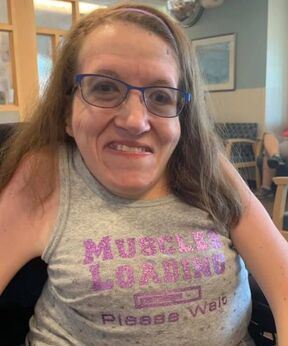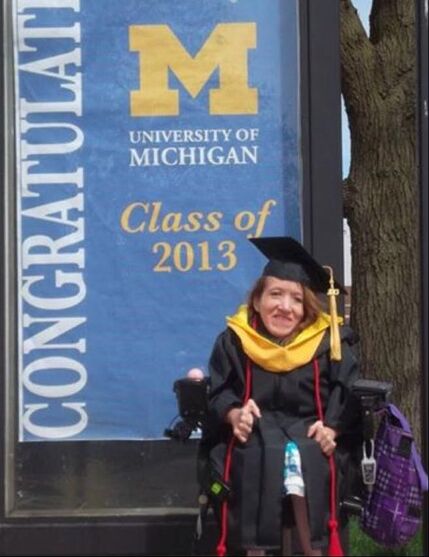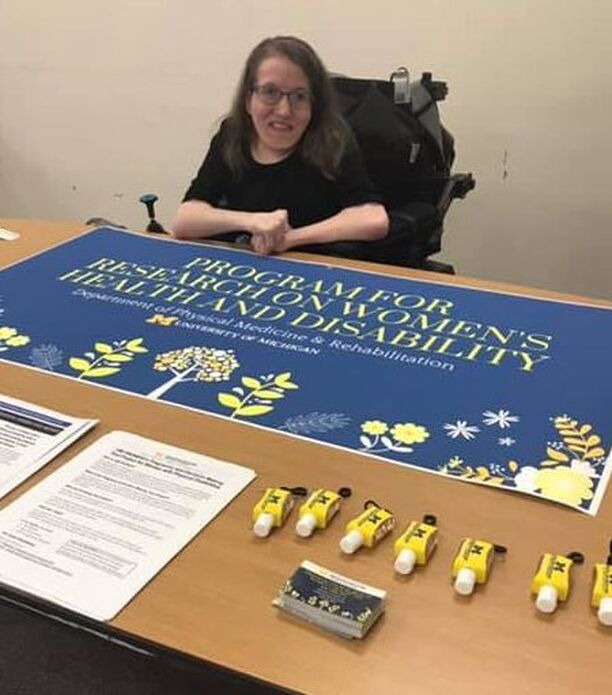|
My name is Rebecca Parten, and I live in Southeast Michigan. I am 31 years old and have Escobar Syndrome, a condition that falls under MDA’s category of Congenital Myasthenic Syndrome (CMS). It occurs when part of the neuromuscular junction’s receptor becomes damaged and does not allow enough of the “messages” or acetylcholine to get through. All of my joints and muscles and my hearing, vision and breathing are affected. I am unable to straighten out my fingers, elbows, hips, knees etc., due to contractures. I have severe scoliosis which has resulted in the need for noninvasive assisted ventilation since I was about 8 years old. I started using BiPap and switched to the Trilogy ventilator when I was about 18. I use my Trilogy at night and have recently started using it during the daytime, if I need a boost. This is usually in the form of a nap, but I have used my mask while working on my laptop. In terms of my other medical conditions, I deal with chronic pain and Adrenal Insufficiency (AI). These two go hand-in-hand because being on my pain medications has affected my adrenal glands’ ability to function. Long story short, AI causes me to struggle with things like fatigue, temperature regulation, respiratory rate and sometimes cognitive issues. I am able to walk short distances but get out of breath really quickly. I use my power chair in the house and in the community. Growing up I was mainstreamed in my local public school system. I then went to The University of Michigan-Dearborn where I received a Bachelor of Arts in Communications. While at UM Dearborn I was in the Honors program and started/led a student organization dedicated to disability awareness. UM Dearborn is a “commuter school,” so I lived at home with my parents and sister who was in high school at the time. Once I graduated with my B.A., I pursued a Master of Social Work degree from The University of Michigan-Ann Arbor. This was a big endeavor, because in addition to the graduate level classes and a field placement, I chose to live on campus! I wanted that experience of living away from home. It was definitely a complicated process to get all my accommodations set up, but we got it done! The biggest things I was concerned about were overnight care and getting around campus. I had (and still have) Medicaid which paid for my care. All of my care hours went to overnight care/monitoring. Basically, my staff would come to the dorm around 10:30 p.m. to help me shower and get ready for bed. Then while I slept, they would sometimes do my laundry, straighten up my room/bathroom. I had a TV and couch in my room so they were comfortable. I felt safer knowing they were there, because occasionally the fire alarm would go off in the middle of the night, and if I was alone, I wouldn’t have been able to get my ventilation mask back on to go back to sleep. In the morning my staff would get me up, help me get dressed and make a lunch if needed. Then I was on my own! UM has a paratransit service so I always had a ride to get to my classes. I worked with the dining hall to let them know when I would typically come to eat, so the student workers knew to keep an eye out for me. They would help me get my food and carry it to a table. Overall there were some hiccups, but it was a good experience and a taste of independence. After graduating with my M.S.W. I moved back home. It took about a year, but I landed a job working for a researcher within Michigan Medicine’s Physical Medicine and Rehabilitation department. I’ve been working with her for 6 years now. Her primary focus area is women’s health issues for women with physical disabilities. My role has evolved over the years, and I’m currently working about 20 hours per week (100% remotely). I am responsible for creating an overall study communications strategy and overseeing the different aspects of this effort. For example: managing our website, social media presence, e-mail newsletter and tracking recruitment numbers. The last few years have been tricky as I’ve had to have some difficult conversations with my supervisor as my ability to do certain tasks has changed. My supervisor has been very accommodating; I know I’m very fortunate. The struggles have been more due to realizing/accepting that I needed help or couldn’t do something. It’s interesting because while some of those struggles were physical tasks, the majority of my difficulties have to do with my chronic pain, fatigue and brain fog/cognitive issues as a result of the AI. Since these are fluctuating issues, it’s sometimes hard to maintain a consistent level of productivity. This obviously affects what I’m able to do for work, and I’m learning what kinds of tasks are better for my current abilities. It’s overwhelming at times, but I enjoy it. If you’re interested in learning more about our research and/or participating in a study, you can find us on:
Editor's Note: Each individual who allows Breathe with MD, Inc. to publish their story on this page in 2021 will be entered into a drawing at the end of the year to win a $100 Amazon gift card! So, what is your story? Start the process of telling us at https://breathewithmd.org/storyform.html or send an email to [email protected]. 3/5/2021 01:53:38 pm
Congrats on your degrees, Rebecca! And your job sounds so interesting. Thank you for sharing your story!
Lucinda
4/2/2021 10:22:01 pm
I enjoyed reading your story. Thanks for sharing! Comments are closed.
|
AboutLiving Ventilated celebrates those in the NMD community who use assisted ventilation. Archives
August 2024
Categories |
Breathe with MD, Inc. is a U.S. registered 501(c)(3) nonprofit organization. Donations are tax deductible to the extent allowable by law.
Note: This website should not be used as a substitute for medical care. For medical care or advice, please seek the care of a clinician who specializes in the breathing issues of those with Neuromuscular Disease (NMD).
Web Hosting by Hostgator
Note: This website should not be used as a substitute for medical care. For medical care or advice, please seek the care of a clinician who specializes in the breathing issues of those with Neuromuscular Disease (NMD).
Web Hosting by Hostgator





 RSS Feed
RSS Feed